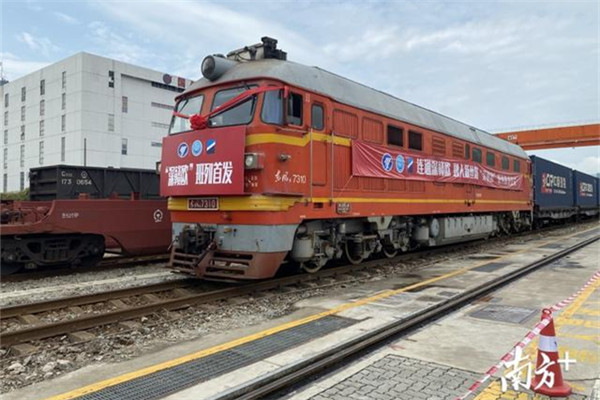Freight train to Duisburg launched
Writer: Han Ximin | Editor: Stephanie Yang | From: Shenzhen Daily | Updated: 2020-05-13
Shenzhen launched its freight train to Duisburg yesterday,carrying freight such as furniture, garments, household appliances and groceries. Duisburg is a German city in the western part of the Ruhr area (Ruhrgebiet) in North Rhine-Westphalia.

The train will operate twice a week.
Running on an important rail link with Europe, the train departs from Yantian Port, and has a customs inspection in Ganzhou, Jiangxi Province, before heading to Duisburg via Xinjiang.
The operation of the Shenzhen-Ganzhou-Europe freight train is part of the move for Shenzhen and Ganzhou cities to push forward cooperation of China’s special economic zone and its former revolutionary area.
It is an important project of the two cities to integrate the construction of ports, industrial parks and cities.
“We planned to set up a company with a registered capital of 2.6 billion yuan (US$366 million) to operate an intelligent inland port area in Ganzhou based on big data and Internet technologies,” said Liu Nan’an, president of Shenzhen Yantian Port Group.
Through the port project, the company hopes to boost the development of the local economy in Ganzhou and Yantian Port will also grow through port business in the inland port of Ganzhou.
As part of a joint effort to fight COVID-19 globally, the operation of China-Europe freight trains takes a new arterial role in global transportation.
“In the history of China-Europe freight trains, it is the first time for us to pilot a collection of cargoes from multiple locations. It is an innovation in the operation mechanism,” Xiao Bin, general manager with Pinghu-Yantian Sea and Rail Joint Transportation Co. Ltd., said during an interview yesterday.
The Shenzhen-Ganzhou-Europe freight train is an extension of the current Ganzhou-Europe train service that can effectively integrate land and sea resources, enhance connectivity and complement trade between the two cities.
“The multiple-location cargo collection method will bring the role of each respective city into full play and improve the efficiency of train operations,” Xiao added.